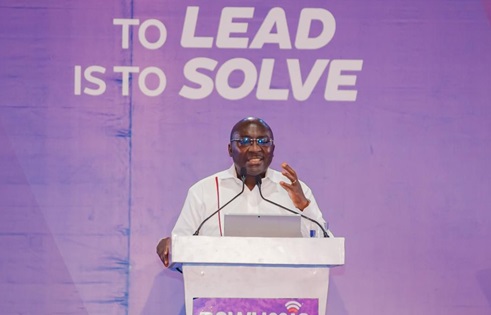The New Patriotic Party (NPP) formally launched its platform for this year’s general elections during a lively ceremony on Sunday at the Ghana Secondary and Technical School (GSTS) in Takoradi, Western Region.
The gathering was intended to energize the party’s base as they prepare for the December 7, 2024 elections.
Excited supporters flocked the grounds, drumming, dancing, and demonstrating their enthusiasm for the party’s goal, turning the arena into a sea of NPP colors.
The occasion demonstrated the party’s concerted effort to support Dr. Mahamudu Bawumia as their presidential candidate, which will help them win the next election.
In order to improve growth, strengthen the economy, and generate jobs, Dr. Mahamudu Bawumia, the vice president and flagbearer of the New Patriotic Party (NPP), has declared that if elected president, his administration will place a high priority on the empowerment of businesses, especially SMEs.
Speaking at the NPP’s 2024 Manifesto launch in Takoradi, Dr. Bawumia emphasized his dedication to putting out audacious measures targeted at boosting business and employment.
He presented a list of pro-business measures, such as a tax system that is advantageous to businesses and direct incentives that are intended to encourage their growth.
The principal incentives put out by Dr. Bawumia consist of:
(i) Granting Investment Tax Credits (ITC) to Ghanaian startups in critical industries for the first three years of their business.
(ii) Establishing a Flat Rate for all importers in order to offer pricing consistency and predictability for imported goods.
(iii) Standardizing port fees to make them comparable to those of other regional ports, especially in Togo, so that taxes at Ghanaian ports are the same or less.
(iv) Applying a “Buy Ghana First” policy, in which public sector procurement gives preference to locally produced goods and services, to encourage industrial and business growth by using the government’s purchasing power.
(v) Ensuring cheap power for businesses and industries requires reforming electricity tariffs to create a structure where commercial rates are either lower or equivalent to residential rates.
(vi)Creating a SME bank to handle the unique funding requirements of small and medium-sized businesses, which employ more than 80% of Ghanaians.
(vii) Creating a Minerals Development Bank to provide funding for feasible local mineral projects, small-scale miners, and Ghanaian mining services companies; changing the licensing system for the small-scale mining sector; and lowering the minerals export tax to 1% in an effort to stop the smuggling of gold.
(viii) Finishing the digitalization of land registration and titling, which will allow property owners to borrow money for expansion and growth of their businesses by using their assets as collateral.
(viiii) Establishing Special Economic Zones (Free Zones) in large border towns including Aflao, Paga, Elubo, Sampa, and Tatale in cooperation with the business sector in order to boost exports, increase jobs, and decrease smuggling.
BY: APPIANIMAA MERCY





